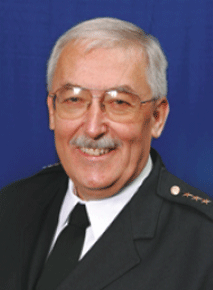
Over the last 115 years, the IACP has served as a leader in the law enforcement profession, striving each day to provide law enforcement executives around the world with the skills, knowledge, and tools they need to lead their agencies effectively.
The IACP’s record of accomplishment in these efforts is a testament to the vision and wisdom of our founders, who realized that having police chiefs working together, sharing information, and learning from the experience of other police executives was fundamental to their ability to protect their communities from crime and violence.
A driving force behind the IACP’s ongoing success is the association’s committees. Our committees, which are composed of dedicated IACP members throughout the world, address the most crucial issues facing the law enforcement community today, ranging from arson and explosives to communications and technology. Over the years, the experts who are members of the IACP’s committees and sections have produced a vast number of publications and projects for the benefit of the law enforcement profession.
In addition, our committees and sections also provide guidance to the association and its members on current developments confronting our profession. For example, the Legislative Committee just completed work on the IACP’s Legislative Agenda for the 111th Congress. This document, which was approved by the IACP Executive Committee, provides policy makers with a clear and concise statement of the IACP’s positions on issues of national importance to the law enforcement community. In addition, the Communications and Technology Committee is spearheading the IACP’s efforts to secure adequate radio spectrum to meet the future needs of the law enforcement and public safety communities.
Clearly, the IACP relies on our committees for a tremendous amount of work. They serve as our subject matter experts on a number of issues that are critical to both the association and the law enforcement profession as a whole. Because of this responsibility, it is not surprising that the IACP has 39 standing committees, several committee coordinating panels panels, and various ad hoc committees. Roughly 1,200 IACP members serve on our committees and are involved in a wide variety of projects, initiatives, and award programs on behalf of the association.
However, from time to time it is necessary to examine the structure of these committees to ensure not only that they are operating in the most effective fashion but also that they are receiving the support and the guidance they need from the IACP. It is for these reasons that I have asked first vice president Michael Carroll to lead a comprehensive review of the IACP’s current committee structure. Joining Vice President Carroll on this “committee on committees” will be the following individuals:
- Past president Charles Reynolds, chief of police (retired), Dover, New Hampshire
- Steven White, chief of police, Doylestown, Pennsylvania
- Vice president at large Sue Riseling, chief, University of Wisconsin–Madison Police Department
- Vice president–treasurer Carl Wolf, chief of police, Hazelwood, Missouri
- Harlin McEwen, chief of police (retired), Ithaca, New York
- Jim Craze, chief of police, Greenbelt, Maryland
Over the coming year, the committee will focus on the need to identify and eliminate any overlap among the committees and the need to examine and refine the mandates of our existing committees to ensure that they are addressing the needs and concerns of current policing issues. In addition, there are several other issues that will be examined, including the following:
- The need for the establishment of committee goals and objectives in order to guide the work of committees and ensure that they are consistent with the goals of the leadership and the IACP strategic plan
- The board oversight process and the responsibilities of oversight vice presidents
- The need to ensure that each committee has the right size and the right mix of members, representing the diverse nature of our membership
- Whether the committees receive adequate funding and staff support from the IACP
- Issues related to committee leadership, including the need for committee chair orientation and training
- The committee appointment process and the removal of noncontributing members
- The promotion and enhancement of intercommittee communication
- The appropriate role for committee coordinating panels
As part of this review process, the committee will be working closely with each committee chair and oversight vice president to gather information on how their committees are currently functioning, to gain a better sense of membership participation, and to solicit recommendations for improvements.
This is an important project. It is because of the hard work and dedication of our committees that the IACP is able to fulfill its mission of addressing and providing solutions to urgent issues facing the law enforcement community. It is our responsibility to ensure that they have the tools and resources necessary to succeed. ■


